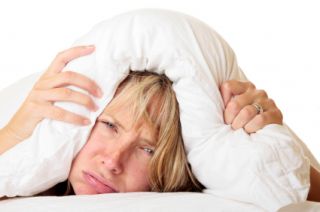Depression
Have Researchers Discovered a Quick Fix for Depression?
The link between insomnia and depression
Posted November 19, 2013

Intuitively, it makes sense that there's a link between insomnia and depression. However, researchers at Duke, Stanford, University of Pittsburgh, and Ryerson University in Toronto are taking a closer look at that link, and their findings, as described by Benedict Carey in The New York Times, could be the most significant advance "in the treatment of depression since the introduction of Prozac in 1987."
Dr. Colleen Carney, the lead researcher of the Ryerson study, which was funded by the National Institute of Mental Health, explored the effect of cognitive behavior therapy for insomnia (CBT-I) when added to the standard treatment for depression. CBT-I is a type of talk therapy where clients are taught to get themselves on a regular sleep-wake schedule, get up when they aren't sleeping, avoid napping, and avoid bad habits before bedtime such as eating and watching TV in bed. Although CBT-I is inexpensive, usually brief, and often effective, it is not a common component of treatment for depression. However, Carney's results could change that.
Carney's study found that 87 percent of subjects who participated in four biweekly sessions of CBT-I reported that their depression symptoms resolved within eight weeks—with and without antidepressant medication. Her results suggest that adding something as simple and as brief as sleep therapy to the treatment regime of depressed clients could double their chances for complete remission of symptoms within a relatively short period of time. With about 18 million Americans experiencing depression each year and approximately half of them reporting insomnia as a symptom, Carney believes that these results could be a significant break-through for the treatment of depression.
Although the Ryerson study included only 66 subjects, the results are similar to a smaller pilot study conducted at Stanford by Dr. Rachel Manber. If the soon-to-be released results from Duke and the University of Pittsburgh are in line with the Stanford and Ryerson studies, it could lead to significant changes in the treatment of depression.

The relevance to high-achieving women is that insomnia is a very common symptom for overachievers, but they often report that they "don't have time to deal with it" and think it will just go away on its own over time. Usually, that's not the case. In fact, it often leads to even worse problems.
Insomnia is not only a symptom of depression; it can actually cause depression—in some case, severe depression. As noted in Carey's article, insomnia can double the risk of developing depression. If these studies result in more public awareness of CBT-I and its effectiveness in short periods of time, it might prove to be a very attractive option for overachievers struggling with insomnia. In fact, improvement can begin right away, even without professional care. According to Dr. Carney, CBT-I can be done on a self-help basis. In her book with co-author Rachel Manber of Stanford, Quiet Your Mind and Get to Sleep: Solutions to Insomnia for Those With Depression, Anxiety or Chronic Pain, she describes how to use sleep therapy effectively on your own.
(If your depression is severe or you're experiencing thoughts of self-harm, please seek the help of a competent professional right away.)
© 2013 Sherrie Bourg Carter, All Rights Reserved
Follow Dr. Bourg Carter on Facebook and Twitter.

Sherrie Bourg Carter is the author of High Octane Women: How Superachievers Can Avoid Burnout (Prometheus Books, 2011).


